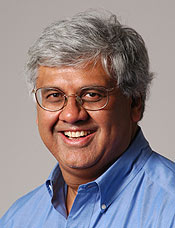Berkeleyan
Sastry named new CITRIS director
![]()
12 April 2005
 Shankar Sastry (Peg Skorpinski photo) |
"We're excited to have Shankar take the helm of CITRIS, an institute that generates research with enormous potential to benefit society," said Birgeneau. "We have every confidence that he will bring great skill and innovation to CITRIS, leading the center as it reaches its next phase of growth."
CITRIS is one of four California Institutes for Science and Innovation established in 2001 to develop the next generation of technologies that will be critical to sustaining California's economic growth and global competitiveness. The institute combines the skills and talents of more than 200 researchers from four UC campuses - Berkeley, Davis, Merced, and Santa Cruz - with those from private industry to develop innovative technology that tackles some of society's most pressing problems.
Currently, there are more than 150 research projects in areas such as disaster preparedness, environmental monitoring, energy management, and health care.
Sastry, a professor of electrical engineering and computer sciences and bioengineering, comes to CITRIS with an exceptional background in technology research, spearheading projects to improve the nation's cybersecurity and network infrastructure, as well as delving into robotics and hybrid and embedded systems.
He received his Ph.D. in electrical engineering and computer sciences at Berkeley in 1981. After stints at MIT and Harvard University, he returned to Berkeley, serving terms as chair of the Department of Electrical Engineering and Computer Sciences and director of the Electronics Research Laboratory.
"CITRIS has already done a fantastic job of addressing a wide number of societal-scale challenges and systems, and I'd like to expand upon those successes," said Sastry. "As CITRIS enters its fourth year, I plan to offer a new palate of challenges for the institute to tackle."
Sastry's vision for the next three years at CITRIS entails the greater use of information technology to promote better health-care delivery at a lower price, advancing multimedia search technologies and improving the security and trustworthiness of societal-scale systems. Also on the CITRIS agenda is research into why certain technologies succeed commercially while others fail.
"New innovations succeed when they're not just wonderful technologies, but when they also provide new services for societal-scale systems," said Sastry.
Sastry noted that in the evolution of CITRIS, the foundation of information-technology research has also formed the basis for research in nanotechnology and biotechnology. "That fusion of research, all with a core of information technology, will be the wellspring from which new and revolutionary advances will come," he said.
Sastry replaces Ruzena Bajcsy, who stepped down as director of the institute on Nov. 1, 2004. Bajcsy, who is a member of the National Academy of Engineering, has returned to the faculty of UC Berkeley's Department of Electrical Engineering and Computer Sciences and will continue to play an active role in CITRIS.
"Ruzena set a high standard with her strong leadership and experience in the CITRIS launch phase, working with government, academia, and industry," said A. Richard Newton, dean of the College of Engineering. "She understood well the mission of CITRIS and the role information technology can play in improving lives, and provided a great foundation upon which Shankar can now build."
Sastry takes the lead of CITRIS as the center's new headquarters are being built on the Berkeley campus. Construction of the new CITRIS headquarters is scheduled to continue through 2007.

